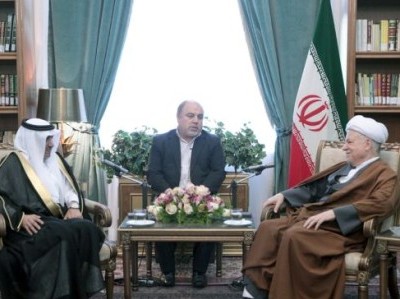Former President Hashemi Rafsanjani (right) meets Saudi Arabia Ambassador Abdur-Rahman bin Gharman al-Shahri on April 22
When President Hassan Rouhani was swept into office in June 2013 on a wave of expectation, with voters hoping he would bring Iran out of the isolating wilderness of the Ahmadinejad era, one of his stated goals was to improve relations with the Arab Gulf states. Central to this is Rouhani’s efforts to forge closer ties with Saudi Arabia.
(See Iran: 7-Point Decoding of Rouhani’s Editorial of “Moderation & Common Sense)
The two leading powers in the Gulf area, Iran and Saudi Arabia have clashed in recent years, not least because of Riyadh’s mistrust about Tehran’s nuclear aspirations. Tensions have been further exacerbated by the Islamic Republic’s revolutionary rhetoric and the notion of Shiite-Sunni division.
The Syrian Civil War, with Iran and Saudi backing opposite sides, has been a large obstacle for those within the Rouhani administration who openly advocate some form of rapprochement. Saudi Arabia’s foreign policy has come under intense criticism from Iranian hardliners, in particular the Revolutionary Guards-linked Fars News, for its support of the Syrian opposition.
Even so, Rouhani has persistently tried to temper the hardline rhetoric with his more diplomatic approach. In the aftermath of the chemical weapons attacks of August 21 by Syrian regime forces, Rouhani attempted to walk a line that did not apportion blame, either on Assad or the opposition and its foreign (i.e. Saudi) backers.
Hardliners have also blamed Saudi Arabia, as well as Qatar, for the rise in attacks against Iranian security forces in Sistan Baluchistan province in southeastern Iran, claiming Riyadh’s “provocation” of the Sunni separatist group Jaish ul-Adl.
(See Iran-Pakistan: Border Tensions Grow Amid New Jaish ul-Adl Attack)
This did not stop the Rouhani efforts. Instead, in December, Foreign Minister Javad Zarif met the leaders of Kuwait, Oman and Qatar to improve relations.
In March, Oil Minister Bijan Zanganeh and Omani counterpart Mohammad bin Hamd Al Ramhi signed a 25-year contract, worth $60 billion, for exports of Iranian natural gas exports to Oman. In April, Zarif visited the United Arab Emirates to meet Prime Minister Sheikh Mohammad bin Rashed.
Zarif’s efforts to secure a similar visit to Saudi Arabia, have so far proved unsuccessful.
But below the surface, the efforts continue. Soon after Rouhani’s election, former President Hashemi Rafsanjani opened back-channel talks with Saudi officials. Significantly, these talks appear to have been endorsed by the Supreme Leader.
The question of Iran-Saudi Arabia ties resurfaced in late April when Rafsanjani met with the Saudi Ambassador to Tehran, Abdur-Rahman bin Gharman al-Shahri. Rafsanjani urged the expansion of bilateral ties between their two countries. For his part, the Saudi Arabian ambassador praised Rouhani’s regional foreign policy and renewed King Abdullah’s offer for Rafsanjani to come and visit him — a possible prequel to a Rouhani trip to Riyadh.
Even the Revolutionary Guards’ Fars News, critics of Rouhani and Saudi Arabia, have softened their tone. It reported Gharman al-Shihri’s comments on the important role played by the Islamic Republic and the Supreme Leader in regional affairs, as it reiterated Ayatollah Khamenei’s declaration that “Unity and companionship among Muslims is an urgent obligation”.
The moment may have come for the Rouhani administration, perhaps through Rafsanjani’s close contacts with Saudi officials, for a concerted push for reconciliation. This could come first through the symbolism of high-level visits, then through substantive talks — bilateral or in combination with others — on issues such as Syria.
The question is whether the Saudis will be receptive, as they continue to sponsor the Syrian insurgency against the Tehran-backed Assad regime.
In April, the architect of Saudi Arabia’s Syria policy, Prince Bandar, was replaced as head of Saudi intelligence. Moreover, the future of Saudi foreign policy is unclear. As Yezid Sayigh, of the Carnegie Foundation has noted, “The looming transition in Saudi leadership … may contribute to the uncertainty and opacity of the kingdom’s foreign policy-making.”
So this could be a window of opportunity for Rouhani’s engagement, as Iran also pursues a comprehensive nuclear settlement with the 5+1 Powers — although whether it stays open may be beyond the control of the Iranian President.

